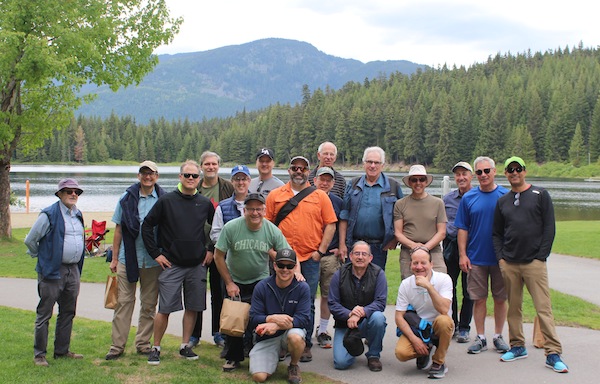Members of Temple Sholom Men’s Club at last year’s Whistler retreat. This year’s event, scheduled for May but canceled due to the pandemic, was to focus on indigenous issues. (photo from templesholom.ca)
Temple Sholom Men’s Club, which hosted the Michael Geller talk May 25 (click here for story), is catching the attention of the larger Reform movement for bucking the trend of declining vibrancy among synagogue men’s groups. In the process, say its leaders, they are also taking a stab at reducing the sociological phenomenon of men experiencing a dwindling social circle.
The synagogue has seen its men’s club grow from defunct to 260 members since being revived in 2016.
President Larry Bloom and vice-president David Schwartz credit the success to individual members stepping up to organize programming. But they also think one of the keys to success is identifying a particular need for men of all ages in the shul community.
Traditionally, they say, sisterhoods have had clear objectives, including fundraising and specific projects. Men’s groups have tended to be more amorphous in terms of their mission.
“Men’s clubs are traditionally, I think, a ‘what have you done for me lately’-type of deal,” said Bloom. “Typically, men’s club programming is maybe a softball team, a dozen guys in the summer, may be a bagel and bite before services, maybe a poker game at somebody’s house once a month or once a season.”
The Temple Sholom Men’s Club reinvigorated itself through a range of programs with what they call “added value.”
A trip to the Vancouver Symphony Orchestra – one of the club’s “co-ed” events – featured a pre-event talk by Gordon Cherry, a former trombonist for the orchestra, as well as from a current VSO member. Movie nights feature guest speakers. When they screened Above and Beyond, the Nancy Spielberg film about the Israel Air Force, Temple member Mark Elster, who served in the Israel Defence Forces, spoke.
Other activities include a regular Mix-and-Mingle before services, family outings to Vancouver Canadians baseball games, beer and wine tastings, educational events, a Men’s Café with Rabbi Dan Moskovitz, the shul’s senior rabbi, Jewish walking tours, and seminars and workshops on topics such as How to Make Your Seder Fun and Meaningful, and Sexual Harassment in the Workplace. Their annual fundraiser – a latke sale that this year fried and sold 1,000 of the Chanukah treats – donates revenue to the Temple Sholom school.
A popular annual retreat in Whistler, scheduled for May but canceled due to the pandemic, was to focus on indigenous issues, including First Nations speakers and a blanket ceremony.
Another popular recurring event is Pastrami and Poker, in which a professional poker facilitator comes in with casino-calibre tables and the mood is distinctly high-stakes. The price of admission includes pastrami sandwiches and $5,000 in chips.
“We play a little Sinatra Spotify in the background and you feel like you’ve gone to Vegas,” said Schwartz. A retired lawyer, Schwartz assures that everything is in line with provincial gaming regulations. At the end of the night, winnings are prorated and paid out in raffle tickets, which are drawn for some swanky donated prizes like high-end Scotch.
Bloom is especially proud that the club attracts men from every age group, something that is not always the case in such forums, he said.
“That was always important to us, that we didn’t narrow our range and just go after the boomers and older,” he said.
The success is a counterweight to the known phenomenon that men’s close friendships tend to dwindle as life progresses.
“I don’t think guys go out of their way to say, ‘Gee, I wish I had more friends,’” said Bloom. “But I think most guys, if they were honest, would probably say, ‘I wish I had more buddies.’… That was very important to us right from the start. Let’s bring guys together, give them a venue, give them an opportunity to come together, socialize and then maybe some bonding will happen after that.”
Bloom, who stresses that his title of president is mostly for administrative purposes and the club functions cohesively as a non-hierarchical group, also credits the success to the support of the synagogue.
“We get a lot of support from the shul, a lot of support from our president of the board, from the board itself, from Rabbi Dan for sure,” he said. “I’m not sure every synagogue gives their men’s club the kind of support we get.”

